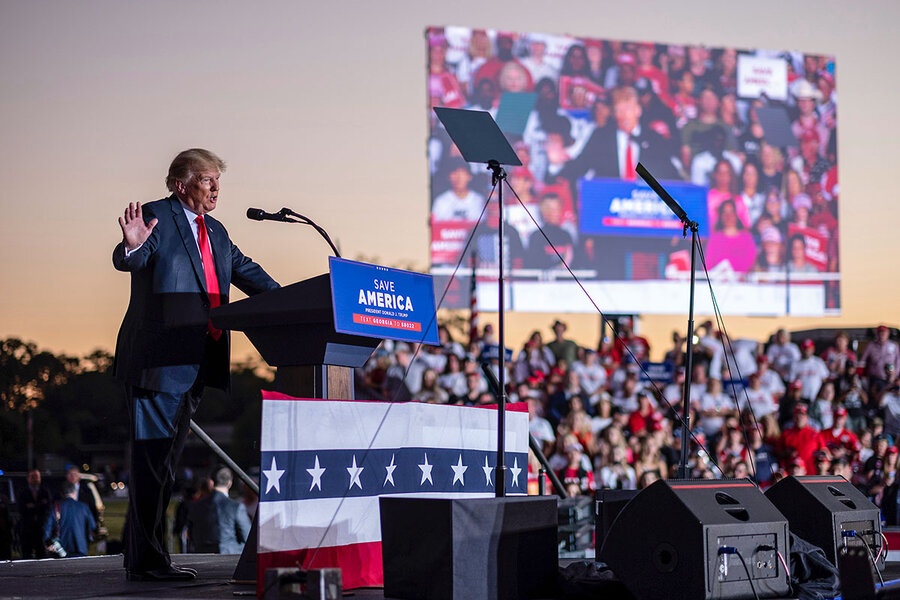The ‘big lie,’ loyalty to Trump – and the defense of democracy
Loading...
| Washington
The “big lie” may be getting bigger.
Former President Donald Trump has long claimed without evidence that Democrats stole the 2020 election, a falsehood that his opponents have dubbed the “big lie.” At a rally in Georgia last week, Mr. Trump expanded this claim to hint – also without evidence – that former President Barack Obama actually lost his reelection race in 2012.
“Nowadays with these elections, who knows if he won?” said Mr. Trump to the roars of supporters gathered at the Georgia National Fairgrounds in Perry.
Why We Wrote This
What does it mean to be a Republican, post-Trump? Less than a year after 2020, a poll finds that claiming the election was stolen is now a defining characteristic.
It has been almost 11 months since last November’s presidential vote. Since then, Mr. Trump has worked hard to broaden and deepen the reach of his false election night statement that “frankly, we did win this election.”
He has continued to push for reexamination of the votes in key states, despite the recent “forensic audit” in Arizona’s Maricopa County, increasing President Joe Biden’s winning margin. In many states, he is pushing preferred candidates for secretary of state, a post that oversees elections.
Meanwhile, Republicans throughout the country are embracing unfounded and vague allegations of fraud in their own elections, spreading the “big lie” down ballot. In the California recall election earlier this month, for instance, GOP candidate Larry Elder said of Democrats, “They’re going to cheat. We know that,” prior to Gov. Gavin Newsom’s historic margin of victory.
The bottom line is that false fraud charges have sown real mistrust about U.S. elections – and further polarized an already divided country. Going forward, it seems likely that the battle for more and more political offices won’t end on Election Day.
“We’re entering a period in which what were once nonpartisan and widely accepted means for determining election outcomes are now becoming partisan and contested,” says David Hopkins, an associate professor of political science at Boston College.
The Eastman memo
Mr. Trump’s Georgia rally is not the only event that has raised the salience of the false stolen-election claim in recent days. The release of “Peril,” the new book on the last days of the Trump administration by Washington Post journalists Bob Woodward and Robert Costa, revealed that prominent conservative lawyer John Eastman gave then-Vice President Mike Pence a six-step memo for overturning the election during the counting of electoral votes on Jan. 6.
Mr. Pence declined to go along with the scheme, as advisers warned him it was outside his constitutional authority. Mr. Trump, the book reported, was furious about Mr. Pence’s demurral.
In addition, last week the Republican-led effort to reexamine the vote in Arizona’s Maricopa County released its long-awaited final report. Mr. Trump and his allies have long said this “audit” would unearth “thousands and thousands” of fake Biden votes. Instead, it produced a final tally that widened Mr. Biden’s victory in the state by a few hundred ballots.
Trump backers pointed to the report’s claim that tens of thousands of ballots might be in question due to various alleged problems, such as the fact that a substantial number of mail-in ballots came from voters listed under prior addresses.
But Maricopa County officials disputed these claims, saying they largely reflected flawed methodology or a misunderstanding of election laws. The company hired to conduct the partisan review, Cyber Ninjas, had no background or training in election recounts. The report itself was careful to note that there could be legal explanations for all the noted discrepancies – and that disputed votes were almost equally balanced between Republican and Democratic voters, meaning neither side would benefit even if they were thrown out.
Yet Mr. Trump and his allies continue to claim the Maricopa effort as a big win, despite its actual findings. And if anything, his effort to push similar reexaminations is gaining momentum in many states. A similar study is well underway in Wisconsin. In Pennsylvania, Republican state senators have voted to subpoena vote records and nonpublic personal information from up to 9 million registered voters.
For Republican political candidates across the country, subscribing to aspects of Mr. Trump’s false stolen-election claim has become an important litmus test. Many grassroots GOP voters demand it. A recent CNN poll found that 78% of Republicans do not believe that Mr. Biden won the election. And 54% believe there is solid evidence of this, though no such evidence exists. Some 59% of GOP voters say that believing the election was stolen is an important part of their own partisan identity.
“Long after there was no chance of anything mattering for the outcome of an election, and there was nothing that was still remaining to be adjudicated, people just went on and on in continually making these claims, ” says Matt Grossmann, director of the Institute for Public Policy and Social Research at Michigan State University. “And politicians were asked to repeat them – or face electoral challengers.”
Spreading to other political contests
With former President Trump pushing down from the top, and voters from his base pushing up from their states and local areas, the stolen-election falsehood has spread beyond the presidential level into lower political contests.
- In California, Trump-backing talk show host Larry Elder posted a “Stop Fraud” page on his campaign website where voters could post affidavits of suspicious activity prior to the Sept. 14 recall election, won handily by Democratic Gov. Gavin Newsom. Mr. Elder, however, did concede on election night.
- In Nevada, Senate candidate Adam Laxalt – whose father and grandfather were both senators – has raised fears of voter fraud and talked about mounting preemptive legal challenges, 13 months prior to midterm elections.
- In Pennsylvania, former GOP member of Congress and current gubernatorial candidate Lou Barletta wrote in an opinion piece earlier this year that “we’ve always known that dead people have voted in Pennsylvania elections, but recently we’ve made it so they don’t even have to leave the cemetery to do so.”
In addition, Mr. Trump has endorsed allies to try to topple elected Republicans who deny his claims of election fraud, such as GOP Rep. Liz Cheney of Wyoming. In Georgia, the former president has endorsed GOP Rep. Jody Hice to run against Secretary of State Brad Raffensperger, a Republican who refused Mr. Trump’s request to find votes to overturn Mr. Biden’s win in the state.
Secretary of state can be an important post, as in many states it is the top official in control of election machinery. Last week Reuters examined the backgrounds of all 15 Republicans running for secretary of state in five battleground states. Ten of them continue to question whether Mr. Trump lost in 2020, according to the news service.
“Loyalty to Trump has become the defining issue of the Republican Party,” says Professor Hopkins.
Wrap all this together, and what the United States is experiencing is a crisis of governance, an attempt to turn previously accepted methods for determining who runs America into new battlegrounds, said speakers at a conference on election subversion held last week by the Fair Elections and Free Speech Center at the University of California Irvine School of Law.
Partisan “audits,” spurious fraud charges, frivolous lawsuits – they all layer a new politicized process over normal methods of counting votes and certifying elections, said Bob Bauer, a New York University law professor and former Obama campaign general counsel.
“If that catches on it would be absolutely disastrous,” said Mr. Bauer.
After all, the goal of the Trump “big lie” is not just to adjudicate an election that’s already occurred. It’s to prepare the way for further such actions in the 2022 midterms and 2024 presidential election.
“The goal is to throw up a lot of smoke and confusion,” said Sarah Longwell, a Republican political strategist and publisher of the conservative website The Bulwark. “Donald Trump is winning a narrative war.”
Overall, the U.S. is facing perhaps a 30% chance that the country will experience a breakdown of democracy by 2024, said Larry Diamond, a senior fellow at the Hoover Institution at Stanford University and author of “Ill Winds: Saving Democracy From Russian Rage, Chinese Ambition, and American Complacency.”
“The imperative is the defense of democracy over all else,” Professor Diamond said.






